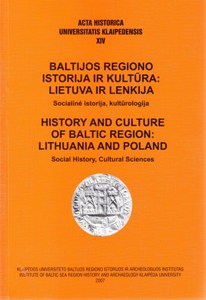Volume 14 (2007): Baltijos regiono istorija ir kultūra: Lietuva ir Lenkija. Socialinė istorija, kultūrologija = History and Culture of Baltic Region: Lithuania and Poland. Social History, Cultural Sciences, December 2007

Order by:
Pub. online: 9 Dec 2007
Type: Article
 Open Access
Open Access
Journal:
Acta Historica Universitatis Klaipedensis
Volume 14 (2007): Baltijos regiono istorija ir kultūra: Lietuva ir Lenkija. Socialinė istorija, kultūrologija = History and Culture of Baltic Region: Lithuania and Poland. Social History, Cultural Sciences, pp. 175–183
Abstract
Pub. online: 9 Dec 2007
Type: Article
 Open Access
Open Access
Journal:
Acta Historica Universitatis Klaipedensis
Volume 14 (2007): Baltijos regiono istorija ir kultūra: Lietuva ir Lenkija. Socialinė istorija, kultūrologija = History and Culture of Baltic Region: Lithuania and Poland. Social History, Cultural Sciences, pp. 185–194
Abstract
Pub. online: 9 Dec 2007
Type: Article
 Open Access
Open Access
Journal:
Acta Historica Universitatis Klaipedensis
Volume 14 (2007): Baltijos regiono istorija ir kultūra: Lietuva ir Lenkija. Socialinė istorija, kultūrologija = History and Culture of Baltic Region: Lithuania and Poland. Social History, Cultural Sciences, pp. 195–207
Abstract
Pub. online: 9 Dec 2007
Type: Article
 Open Access
Open Access
Journal:
Acta Historica Universitatis Klaipedensis
Volume 14 (2007): Baltijos regiono istorija ir kultūra: Lietuva ir Lenkija. Socialinė istorija, kultūrologija = History and Culture of Baltic Region: Lithuania and Poland. Social History, Cultural Sciences, pp. 209–214
Abstract
Pub. online: 9 Dec 2007
Type: Article
 Open Access
Open Access
Journal:
Acta Historica Universitatis Klaipedensis
Volume 14 (2007): Baltijos regiono istorija ir kultūra: Lietuva ir Lenkija. Socialinė istorija, kultūrologija = History and Culture of Baltic Region: Lithuania and Poland. Social History, Cultural Sciences, pp. 215–255
Abstract
Pub. online: 9 Dec 2007
Type: Article
 Open Access
Open Access
Journal:
Acta Historica Universitatis Klaipedensis
Volume 14 (2007): Baltijos regiono istorija ir kultūra: Lietuva ir Lenkija. Socialinė istorija, kultūrologija = History and Culture of Baltic Region: Lithuania and Poland. Social History, Cultural Sciences, pp. 227–232
Abstract
Pub. online: 9 Dec 2007
Type: Article
 Open Access
Open Access
Journal:
Acta Historica Universitatis Klaipedensis
Volume 14 (2007): Baltijos regiono istorija ir kultūra: Lietuva ir Lenkija. Socialinė istorija, kultūrologija = History and Culture of Baltic Region: Lithuania and Poland. Social History, Cultural Sciences, pp. 233–244
Abstract
Pub. online: 9 Dec 2007
Type: Article
 Open Access
Open Access
Journal:
Acta Historica Universitatis Klaipedensis
Volume 14 (2007): Baltijos regiono istorija ir kultūra: Lietuva ir Lenkija. Socialinė istorija, kultūrologija = History and Culture of Baltic Region: Lithuania and Poland. Social History, Cultural Sciences, pp. 245–258
Abstract
Pub. online: 9 Dec 2007
Type: Book Review
 Open Access
Open Access
Journal:
Acta Historica Universitatis Klaipedensis
Volume 14 (2007): Baltijos regiono istorija ir kultūra: Lietuva ir Lenkija. Socialinė istorija, kultūrologija = History and Culture of Baltic Region: Lithuania and Poland. Social History, Cultural Sciences, pp. 259–260
Pub. online: 9 Dec 2007
Type: Book Review
 Open Access
Open Access
Journal:
Acta Historica Universitatis Klaipedensis
Volume 14 (2007): Baltijos regiono istorija ir kultūra: Lietuva ir Lenkija. Socialinė istorija, kultūrologija = History and Culture of Baltic Region: Lithuania and Poland. Social History, Cultural Sciences, pp. 261–262